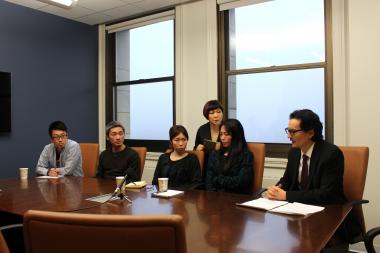Published in DNAinfo, February 25, 2014.
QUEENSBRIDGE — The family of a Japanese student who was fatally struck by a police car in Queens last year is pushing the NYPD for answers regarding his death.
At a press conference in Manhattan on Friday marking the one-year anniversary of 24-year-old Ryo Oyamada’s death, his sisters said their family is still waiting for the NYPD to turn over evidence they’ve requested several months ago stemming from the night of the crash.
Police at the time said officers responding to a 911 call on Feb. 21, 2013 were driving east on 40th Avenue in Long Island City when they struck Oyamada, who the NYPD said had been trying to cross in the middle of the road, between 10th and 11th streets.
Oyamada’s family filed an $8 million federal lawsuit against the city in May. On Feb. 7 a judge ordered the city to produce records and documents relating to the incident within 30 days.
“We have been trying to find out the truth,” Tomoko Suzuki, Oyamada’s older sister, said via a translator. “If what they have told us is true, they have no reason to withhold any information.”
A lawyer for the family, Chris Fitzgerald, said that so far the city has allowed him to inspect the patrol car that was involved in the crash and provided data from the vehicle’s black box, though he says it did not reveal anything substantial.
But they are still waiting on the NYPD to release its report of the incident, the results of its Internal Affairs investigation, the recording of the 911 call police were responding to, as well as video surveillance footage from a nearby NYCHA complex they say they were told showed Oyamada and the patrol car in the moments before the crash.
“One of the cornerstones of a healthy democracy is the transparency and accountability of society’s public servants and public agencies,” Fitzgerald said. “They deserved these answers last year.”
According to Fitzgerald, the NYPD said the patrol car had its emergency lights and sirens activated at the time of the crash. But the lawyer said he has witnesses who say they saw no lights and heard no sirens. He also questions why the police have not yet turned over the requested surveillance footage.
“If a police officer is accused of shooting somebody inadvertently, but they have footage that exonerates that individual, that footage gets released right away,” he said, but added he’s not certain what the tape will reveal.
“It might just be grainy footage that doesn’t show anything definitive,” he said.
A witness at the time told DNAinfo New York that the police car had its sirens blaring, but another witness told Gothamist that the car’s lights and sirens were not on.
NYPD officials met with Oyamada’s family in the days after his death last year, according to Fitzgerald, where he said the police “made sure that the family felt that it was somehow Ryo’s fault that he died.” The officials told the family Oyamada had headphones and a knit cap on while crossing the street, Fitzgerald said.
Oyamada’s other sister, Kaoru Takano, described the NYPD’s attitude toward her family as “unbelievable” and “very cold.”
“We have never received any explanation that has convinced us,” she said through a translator.
A spokesman for the city’s Law Department said the matter is in litigation and declined to comment further. The NYPD did not immediately respond to a request for comment.

